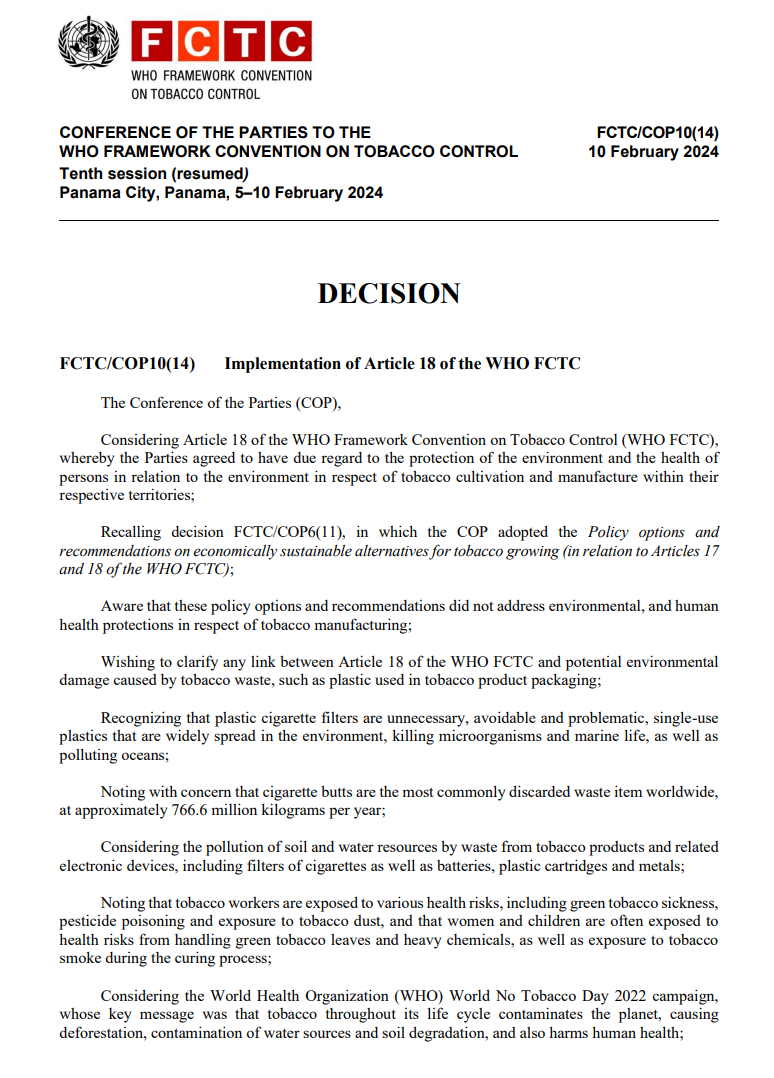The tenth Conference of the Parties (COP 10) of the WHO Framework Convention on Tobacco Control (FCTC) adopted a series of key Decisions including a decision entitled “Implementation of Article 18 of the WHO FCTC” that addresses the “environmental concerns associated with tobacco.”

ASH is a proud supporter of this Decision adopted by a UN body composed of 184 Parties (183 countries and the European Union). The broad global support from the COP10 Article 18 (Environment) Decision clarifies the environmental impact of tobacco products throughout their entire life cycle, calls on countries to take action to address the environmental impacts of tobacco products, and calls on increased cooperation between the FCTC and environmental mechanisms.
As Inger Andersen, Executive Director of the UN Environmental Programme stated in her opening statement to COP 10, there is a need for increased collaboration between FCTC and UN environmental agendas. This COP10 Decision reaffirms the negative impact of tobacco products and reminds us that tobacco and the FCTC must be taken into consideration when working on the global environmental agenda, including the negotiations of the UN Treaty to End Plastic Pollution.
Key Elements of the COP10 Article 18 Decision:
- Recognizes “that plastic cigarette filters are unnecessary, avoidable and problematic, single-use plastics that are widely spread in the environment, killing microorganisms and marine life, as well as polluting oceans;”
- Points to “the pollution of soil and water resources by waste from tobacco products and related electronic devices, including filters of cigarettes as well as batteries, plastic cartridges and metals;”
- Reminds us that “that WHO has recommended an immediate ban on cigarette filters and vaporizers in its submission to the Intergovernmental Negotiating Committee on Plastic Pollution;”
- Invites countries to use litigation “under Article 19 of the WHO FCTC, to hold the tobacco industry accountable for the damage it causes to the environment;”
- Alerts us that the tobacco industry uses environmental projects as part of its greenwashing/corporate social responsibility strategy and reminds us of the need to “reduce tobacco industry interference in tobacco control policies” including in the context of environmental protection projects associated with tobacco, and urges Parties “in accordance with WHO FCTC Article 5.3, to protect tobacco-related environmental policies from the commercial and vested interests of the tobacco industry and those working to further its interests;”
- Reinforces that “this decision aims at aligning the WHO FCTC work with the principles, objectives and commitments of other international agreements, without interfering with their implementation, as well as without precluding the results of ongoing negotiations within international environmental fora, including but not limited to the Intergovernmental Negotiating Committee on Plastic Pollution;”
- Points out “the work of the Intergovernmental Negotiating Committee on Plastic Pollution, the issue of microplastic pollution caused by plastic cigarette filters, ongoing global efforts in the development of standards for hazardous waste management under environmental laws, and the fact that the WHO FCTC has been officially referenced during the United Nations plastics treaty negotiations.”
This historic decision will help advance health, environmental, and sustainable development goals and objectives.
Next Steps: How to Connect the WHO FCTC with the UN Treaty to End Plastic Pollution
- Include the WHO FCTC in the Preamble of the Zero Draft for the UN Treaty to End Plastic Pollution. The FCTC has been recognized by the UN Development Programme as an accelerator for the environmental goals in the UN Sustainable Development Goals and as such must be included alongside other relevant treaties in the Preamble of the Zero Draft of the Plastic Treaty. The FCTC should be mentioned in this section of the Zero Draft:
“reaffirming the importance of cooperation, coordination and complementarity among relevant regional and international conventions and instruments, with due respect for their respective mandates, to prevent plastic pollution and its related risks to human health and adverse effects on human well-being and the environment.”
- Ensure that plastic cigarette filters are included in the list of “Problematic and avoidable plastic products, including short-lived and single-use plastic products” in the Zero Draft.
As stated in the FCTC COP10 Article 18 Decision: “plastic cigarette filters are unnecessary, avoidable and problematic, single-use plastics that are widely spread in the environment, killing microorganisms and marine life, as well as polluting oceans.” The Decision goes on “to urge Parties to take into account the environmental impacts from cultivation, manufacture, consumption and waste disposal of tobacco products and related electronic devices.”
- We call on countries negotiating the UN Treaty to End Plastic Pollution to ensure that adequate firewalls are put in place to guarantee that corporate conflicts of interests do not undermine the outcomes of the negotiations of the treaty to end plastic pollution.
As the Article 18 Decision reminds us, the “tobacco industry is increasingly using actions related to environmental and sustainability claims to mask the damage it causes and to promote itself through extended producer responsibility systems” and calls on countries to align with “WHO FCTC Article 5.3, to protect tobacco-related environmental policies from the commercial and vested interests of the tobacco industry and those working to further its interests.” The tobacco Industry must not be treated as a “stakeholder” or “responsible producer” but should be made to pay for the pollution.








